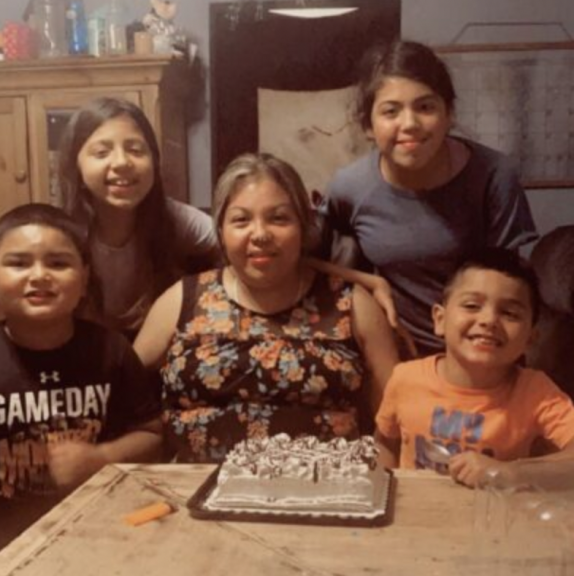Immigrant women face language, cultural barriers to pregnancy care

Fabiola Silva gathers with her kids and nieces and nephews for a photo. Silva is one of the one in 10 Champaign County residents who are immigrants and one of the over 4,000 people who speak Spanish in the County. Fabiola Silva
This article is the first in a series about the access to pregnancy care for immigrants in Champaign. You can read part two here and part three here.
“Why are you having more children?”
That’s a question a doctor in Champaign asked Fabiola Silva during a doctor appointment.
“He started asking me a lot of questions that weren't even relevant,” Silva said in Spanish. “Instead of helping me, he was kind of scolding me.”
Silva is one of the one in 10 Champaign County residents who are immigrants, as well as one of the over 4,000 people who speak Spanish in the County.
Her story is similar to that told by many immigrant women both in Champaign and throughout the country who don’t speak English and have had trouble accessing pregnancy care.
Kimberly Fryer, OBGYN and assistant professor at University of South Florida, said she noticed a lot of barriers for immigrants and Spanish-speakers to prenatal care even beyond language.
Fryer conducted a study made up of focus groups of Spanish-speaking women, which she said had a goal of looking more closely at the specific barriers Spanish-speaking women were facing to prenatal care.
“It was really to do a deeper dive into what those specific issues were and really trying to come up with what, kind of in a more systematic way, not just what I saw in the clinic, of what those issues actually were,” she said.
Fryer said, among other barriers, the most prominent that were specific to Latinx women were language, bias and racism and undocumented status.
Many of the women in Champaign cited language and bias as some of the biggest and most frustrating barriers.
Though many of the hospitals and clinics in Champaign undergo bias training, Fryer said that it isn’t always that easy to just get rid of bias.
“It could be some things that are very implicit and that you wouldn't necessarily think would be a bias but becomes a bias,” she said. “It becomes kind of systematic because all of a sudden, you're being treated differently just because you don't speak English.”
For example, in Silva’s case and many other women's, the judgment of how many kids she wanted to have might be considered biased.
But, Silva said that, above anything, language has been the biggest barrier for her to overcome.
Silva is from Tamaulipas, Mexico. She came to Champaign from Texas, where she said it was easy to find people who spoke Spanish.
In Champaign, she said, that wasn’t the case.
“Language did hinder me a lot because in Texas, most of the people speak Spanish,” she said. “It was very, very difficult because I didn't know how to speak English.”
Silva arrived in Champaign four months pregnant, and she said she didn’t even know how to order food in English – just hot dogs.
So, when she went to seek prenatal care, she said, she had a lot of trouble.
She said she ended up finding somewhere to go because her husband asked a friend of his whose wife was pregnant for recommendations.
Silva was referred to a program for Women, Infants, and Children (WIC), which arranged an insurance card for her and sent her to find a doctor.
Silva’s husband had been helping her through this since he knew some English, she said, but eventually, he got too busy with work.
“He didn't have the time to go around back helping me, that is, taking me to the doctor and so on,” she said. “I didn't even know where to look.”
And though Silva did find a clinic, one that she said often helps immigrants, the care she was receiving wasn’t exactly the best, she said.
“I did have several bad experiences,” she said. “ I don't know if it is because they have a lot of (patients) or they are busy or the people are already very tired - the doctors. I don't know.”
Doctors, she said, don’t always take the time to understand other people and their cultures, so they aren’t well-informed about immigrants and their experiences.
“They don't take the time to pay attention to that, you know?” Silva said. “There are many people who lack information and more when someone comes from Mexico, from somewhere else, because of culture or ignorance or I don't know.”
To avoid judgment and even more bad experiences, Silva said, whenever she had doubts, she would just stay quiet.
And this is something health care workers said they’re aware of.
Ashley Munoz, breastfeeding peer counselor and translator at CUPHD, said that the judgment patients may feel often comes directly from a language barrier, which makes it harder for both patients and doctors to communicate both words and attitudes.
“Sometimes they feel like we're judging them if they do something wrong or they don't do something,” Munoz said. “If you get them feeling like they can’t trust you or you're judging them, they'll stop talking to you.”
She said healthcare providers need to be thorough and clear when communicating with patients, as well as educate themselves on their patients’ and clients’ backgrounds.
“The most important thing is clear communication with this population and building a trust with these people and learning from them, their backgrounds, their stories,” she said. “That's how you know how to help them, and know what they need.”
Carolina Garibay is a student reporter with the Illinois Student Newsroom. Follow her on Twitter @carigaribay.

